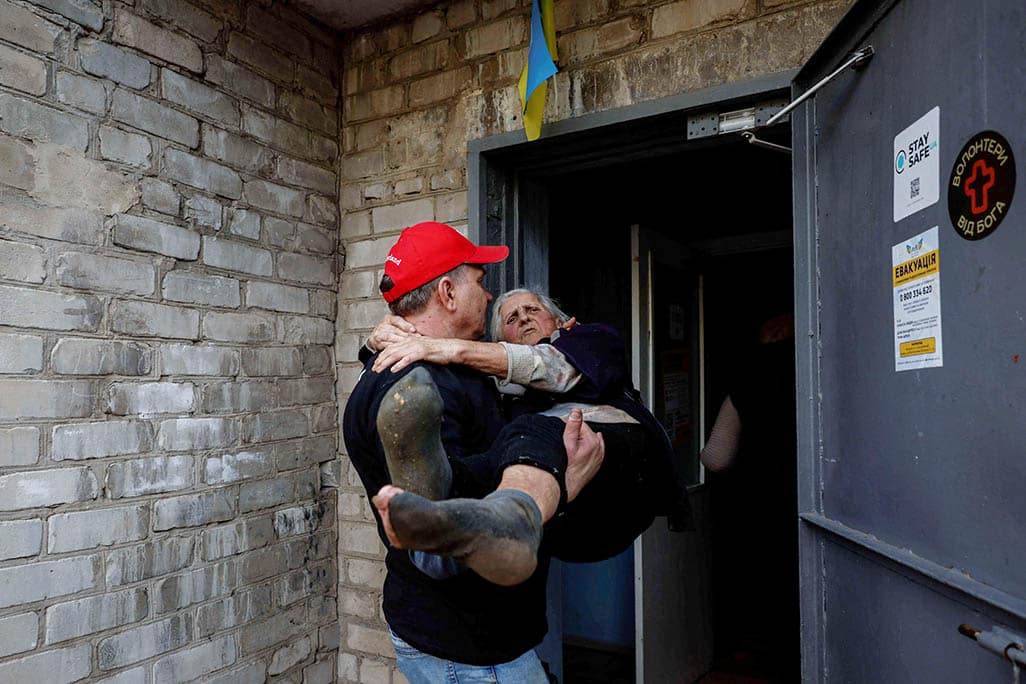Yevhen Tkachov, a volunteer aid worker and devout Pentecostal from Ukraine’s eastern Donbas region, spent much of his life travelling to the world’s war zones helping civilians in need.
Nearly 10 years ago, his own homeland erupted into conflict, and the war never went away.
“Right now I think it makes the most sense to help my own people,” said the 54-year-old, who is also a qualified veterinarian, after making his daily dash to deliver aid to the residents of Chasiv Yar, a once-sleepy, tree-lined town of 12,000 where he grew up.
It is now close to the front line between Ukrainian and Russian forces, and many of its buildings are damaged or destroyed. The air is frequently pierced by the crash of incoming artillery and boom of Ukrainian cannons nearby.
Like most people from Chasiv Yar, Tkachov has moved further from the fighting though some remain.
All of them have lived through nearly a decade of war, a reminder that for millions in eastern Ukraine the conflict has rumbled on since 2014, long before Russia’s full-scale invasion in February last year grabbed the world’s attention.
Tkachov returns to the town each day delivering water and animal feed to mostly elderly residents who have stayed on despite persistent encouragement to flee.
On a recent trip, Reuters accompanied Tkachov on a visit to an 84-year-old, bedbound woman who had changed her mind and agreed to be taken to safety.
Tkachov lifted and carried her to his pickup truck as the crackle of gunfire broke out nearby – Ukrainian troops firing into the sky at a Russian drone.
“I love the smell of napalm in the morning,” he grinned, quoting from the film “Apocalypse Now” and opening a fizzy drink can as the shooting grew louder.
BUILD-UP
Ukraine and its Western allies say Russia infiltrated eastern Ukraine with fighters and intelligence operatives to stage a coup in Donbas in 2014 which Moscow subsequently supported with regular troops.
Russia denied those allegations at the time, describing the events as a local rebellion against a government it accused of hostility to Russian speakers, which most Donbas residents were.
President Vladimir Putin subsequently acknowledged Russian personnel had carried out “certain tasks” in Ukraine, and Reuters reporters found evidence that Russian soldiers had been sent into Ukraine.
The region, comprising the provinces of Donetsk and Luhansk, was home to over 6 million people when war broke out, many working in vast coal mines and steel mills.
It suffered devastating economic collapse after the fall of the Soviet Union, but by the early 2010s its fortunes were recovering. Nobody thought war was on the horizon.
“People were renovating (homes), there were queues for workmen to put in new windows or heating,” Tkachov recalled. “Nobody thought something like this would happen.”
A popular uprising in early 2014 against pro-Russian President Viktor Yanukovych forced him to flee to Russia by helicopter. He was from Donetsk province and popular in the area. Many locals were suspicious of the government that replaced him.
Although Tkachov is pro-Ukrainian, he said many others in the region did not share that view in 2014. Few before the war were openly pushing to join Russia, he said, but some people did not feel fully Ukrainian.
CRIMEA AND DONBAS
After its ally Yanukovych was ousted from Kyiv, Russia annexed Crimea, the southernmost part of Ukraine which was also home to Moscow’s Black Sea fleet.
Armed militants also began seizing government buildings and declared “people’s republics” in Donetsk and Luhansk, and, after an initial period of shock, Kyiv sent in an army hollowed out by decades of neglect.
“People saw all these rustbuckets breaking down on our roads, and so few people bet on Ukraine,” recalled Tkachov, referring to old military vehicles deployed at the time. He began to deliver clothes, food and medicine to Ukrainian soldiers.
He said that, while delivering aid and helping evacuate people from the then-separatist controlled city of Sloviansk in July 2014, he and his friend were arrested, detained and accused of helping target Ukrainian artillery and being foreign spies.
“We laughed at them, really,” he added.
A verdict at his trial never came. The Ukrainian army, by now bolstered by volunteers and donations, was on the attack and their captors locked the men in cells and rushed off, vowing to return.
Reuters was unable to verify the events independently, but Tkachov said he eventually discovered the separatists had fled.
“An old man with a torch opened the cell door and said: guys, come out, there’s nobody here,” he said.
FULL-SCALE WAR
The U.N. human rights office estimated that more than 14,000 military personnel and civilians were killed in eastern Ukraine from early April 2014 to the end of 2021.
Unlike some of his neighbours, Tkachov took warnings that Russia could launch a full-scale invasion of Ukraine in 2022 seriously, and prepared the old people’s home he ran in Chasiv Yar for a lengthy blockade.
When Russia did attack on Feb. 24, 2022, one thing stunned him: the response of other locals was one of defiance and resistance, a marked contrast to 2014.
“I was so surprised by the patriotism,” he said. “I didn’t think that thousands of people would join territorial defence units!”
Tkachov put the change down to a generational shift: teachers who learnt Ukrainian history after independence and the fading influence of those who pined for a return to Soviet ways.
Still, the war is not over. Tens of thousands of Russian troops are trying to smash through Ukrainian lines across Donetsk and Luhansk.
“I am currently pessimistic, although a year ago I was optimistic,” Tkachov said, when asked about the region’s future.







Click here to change your cookie preferences